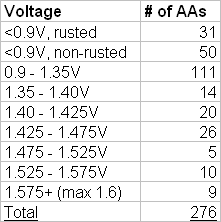
It all started when a friend needed 4 AAA batteries for his classroom clicker. We had no spares so I fished some out from the battery drop-off boxes scattered across campus, hoping to get very lucky. As expected, the clicker wouldn't start up with those batteries because they were supposedly dead.
But I had a nagging suspicion that there were a few batteries in that huge drop-off box with enough charge to power that clicker for at at least a few minutes. Or at least cause that bunny to hit the drum once.
I pulled about 20 AAs from the bin to test my clock(takes single AA, 1.5V) and found that just under half of them could power my quartz clock. Of the rest, a few could only move the minute hand from 12 to 7, and a few more could cause the minute hand to vibrate every second. Only about a quarter of the 20 did absolutely nothing when plugged into clock.
And even the "weak, 12 to 7 tickers" were able to power my clock for 3 weeks when the clock is left flat on the ground. (less gravity to overcome)
This proved to be an interesting and potentially useful discovery. I randomly collected a total of 421 batteries across various locations on campus. Then I used a voltmeter to test and categorize each battery according to its measured voltage and its battery type. Five types of batteries were collected: AAA, AA, C, D, and 9V.
------------------------------------------------------------------------------
AAA Batteries (1.5V):
------------------------------------------------------------------------------
AA Batteries (1.5V):
------------------------------------------------------------------------------
C Batteries (1.5V):
------------------------------------------------------------------------------
D Batteries (1.5V):
------------------------------------------------------------------------------
9V Batteries:















No comments:
Post a Comment